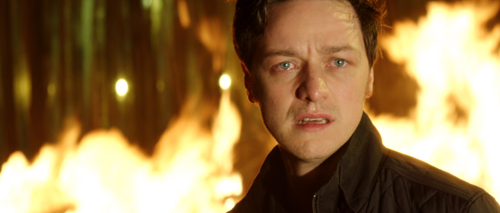
 Based on a 2001 British made-for-TV movie, Danny Boyle’s Trance casts X-Men: First Class’ James McAvoy (presumably standing in for Ewan McGregor) as Simon, an art auctioneer who becomes a media hero for foiling the heist of an über-valuable painting, yet pays the price when the would-be thief, Franck (Vincent Cassel, Jason Bourne), comes looking for it.
Based on a 2001 British made-for-TV movie, Danny Boyle’s Trance casts X-Men: First Class’ James McAvoy (presumably standing in for Ewan McGregor) as Simon, an art auctioneer who becomes a media hero for foiling the heist of an über-valuable painting, yet pays the price when the would-be thief, Franck (Vincent Cassel, Jason Bourne), comes looking for it.
Trouble is, the knock to the noggin Franck gives Simon during the fray results in a bout of amnesia. To jog the priceless artwork’s location from the recesses of Simon’s mind, Franck sends him to a hypnotherapist (Rosario Dawson, Sin City).
From then on, viewers can question how much of what Boyle shows you can be trusted, as fragments of their hypnotizing sessions bleed into reality, and vice versa. While some may call this approach a mind-fuck, Trance emerges as too much of a mess to earn that badge.
Boyle sandwiched this baby in between his two-year planning stint as artistic director for the 2012 Olympics in London, and it shows. Whereas every twist and turn and layer of Christopher Nolan’s then-recent Inception felt meticulously graphed and charted and calculated, Trance feels as if its script pages were thrown into the air, and whatever Boyle caught, he shot and edited in that order.
The result is minor Boyle (as opposed to the major likes of Trainspotting). I admire sequences of the film while being somewhat cold on it as a whole. The theatricality of certain scenes is one plus, bearing influence of Boyle’s other Olympics side project, a UK stage production of a radically rebuilt Frankenstein. I think in particular of a scene where Simon hears Franck and his goons plotting against him in a loft above; he and we see the bad guys only as larger-than-life silhouettes amid butterscotch-colored light — a gorgeously structured image in a movie teeming with ugly deeds.
At least one of those scenes springs with a smidgen of goodwill, but it’s an unintended howler. I won’t spoil it, but you’ll know it when you see it. Or hear it, rather — just listen for the sound of an electric razor buzzing to life.
Art and artifice are Boyle’s ultimate themes, and he joyously maneuvers his characters so we’re constantly wondering, “Who’s manipulating whom?” The answer is that Boyle is manipulating his audience, but not skillfully enough that most viewers will be in the mood to be shifted and shoved. Trance is too slick and too empty for its own good. —Rod Lott

